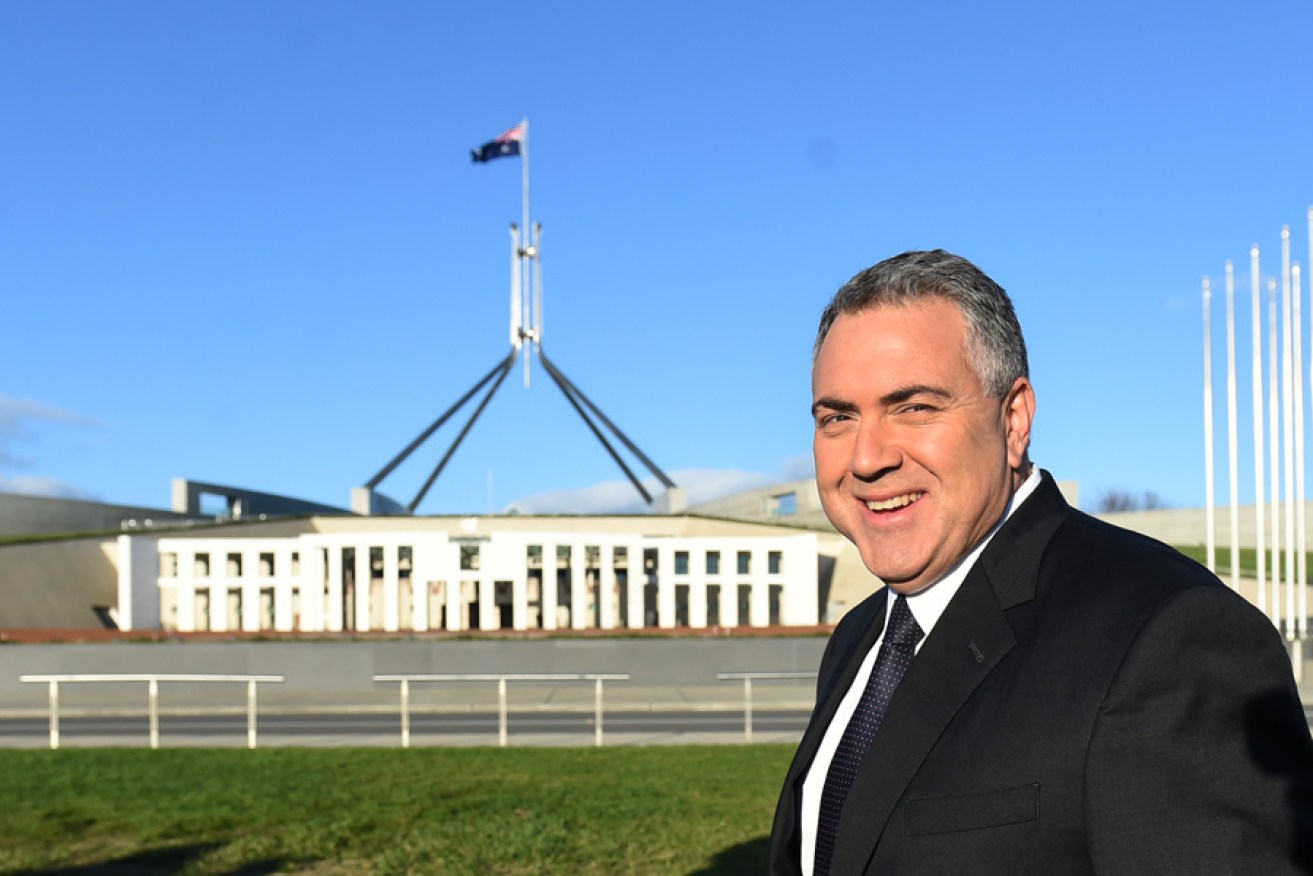Budget 2015: Debt disaster is so last year

Treasurer Joe Hockey outside Parliament House this morning.
A year ago, the Abbott government went after the young jobless. In keeping with his first budget’s credo, which held that this was a nation of “lifters, not leaners”, Treasurer Joe Hockey announced that jobless Australians aged under 30 would have to wait for six months before receiving unemployment benefits.
Here were the tough economic realists, the guys who knew how to run budgetary policy at work. Surplus budgets and competent economic management were in their DNA. This was the tough medicine that the nation needed.
But it turns out that Joe Hockey and Tony Abbott were wrong. Young job-seekers did not need to be beaten up. We have this on the authority of the Treasurer himself.
Thanks to the 2015-16 budget, we now know that jobless under-30s actually need love. They need money, jobs programs and support. They need only wait four weeks before accessing Newstart.
How can a policy be so right and then so wrong? It’s the difference between ideology and politics. The 2014-15 budget was an ideological document, a cack-handed, uneven, clumsily communicated effort. But it was big on hairy-chested, doctrinaire policies. This was Hockey’s small-government, end-of-entitlement belief system made flesh.
But doctrinaire gestures and policies don’t count for anything if they are going to kill the government that is trying to implement them. The 2015-16 budget is an almost uniformly political document, an attempt at survival.
That is why the tough stuff has been dropped. A majority of voters hated measures such as the hit on the under-30s and were lining up to belt the government because of them.
The regime of cuts that was so vital last year is no longer necessary. Instead, the economy needs spending.
Last year, the country needed to be rescued. Now, things are OK. Sure, we are facing some headwinds with a fall in the iron ore price, but Australia is one of the fastest-growing economies in the developed world that will, according to Treasurer Hockey, grow even faster over the forward estimates.
It is the sort of thing that governments say when they are heading into an election. A good deal of Hockey’s budget speech sounded like a standard collection of feel-good pre-election rhetoric. Here were the references to terrorism, to drought, to the good signs in the global economy, to families, to the importance of small business, to farmers.
It was a “good news” budget at a time when the economic news has not been exactly bad but has rarely been all that good. The career-defining test for Hockey and for Abbott is whether the public will find that disconnect jarring.
It is a big-spending, big-taxing form of government – pretty much running along at similar levels to the size of government when Wayne Swan was delivering budgets and dealing with the global financial crisis and its aftermath – that will not necessarily offend voters.
Essentially, the Coalition’s message to the electorate has taken a series of unpredictable turns. In the lead-up to the 2013 election, it declared with great conviction a budget emergency. Upon taking office, it tried to uphold the emergency analysis while pulling back from the harsher, more alarmist rhetoric.
In the 2014-15 budget, it amped it up again and held things at that level until late in 2014. But since February, when a leadership spill motion was debated in the Liberal Party room, the retreat on policies and rhetoric has been in full swing. The Abbott government’s second budget is a comprehensive expression of that reversal.
There’s not much in it. It does not attempt reform, so-called, that conforms to any of the cherished precepts held by either the government’s friends in business, market economists, supportive think tanks or a large segment of the Liberal Party itself.
The end of the age of entitlement is no longer upon us, it is still a long way off. Or to put it more precisely, the end has come but only for a few: foreign investors, foreign multinationals that the government says will be hunted down and punished for avoiding their fair share of tax to Australia – even foreign backpackers have lost their tax holiday. A pattern in that list is surely hard not to see: no-one in that group gets a vote at Australian elections.
It is a big-spending, big-taxing form of government – pretty much running along at similar levels to the size of government when Wayne Swan was delivering budgets and dealing with the global financial crisis and its aftermath – that will not necessarily offend voters.
The political history of Australia since the beginning of this century does suggest that the minimalist approach contained in this budget might be closer to the preferences of many Australian voters than adventurous, disruptive policies that inflict short-term pain while promising longer-term gain. And voters react with hostility to bad news.
Certainly it’s a style of governing favoured by the Liberal Party’s base, especially the over-55 voters who are its electoral bedrock. That is what the prime minister will be hoping. It is in that framework that this budget was designed – to get politics off the front pages, as the saying used to go in the pre-digital era – so as to give him the option of calling an election later this year.
Politicians rarely get a chance to ratchet up their courage the longer they are in office. This budget kicks the budget deficit further along the road and, it seems, Hockey’s dream of a remade Australia further along than that.
Shaun Carney is an adjunct associate professor in the School of Social Sciences at Monash University.
This article was first published at The Conversation.




